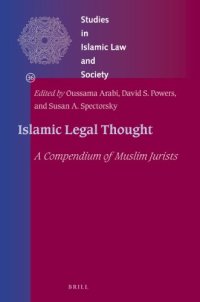
Ebook: Islamic Legal Thought: A Compendium of Muslim Jurists
- Genre: Religion
- Tags: Islamic Law Fiqh Islam Religion Middle East Studies Theology
- Series: Studies in Islamic Law and Society
- Year: 2013
- Publisher: Brill
- Language: English
- pdf
In Islamic Legal Thought: A Compendium of Muslim Jurists, twenty-three scholars each contribute a chapter on a distinguished Muslim jurist. The volume is organized chronologically and it includes jurists who represent the formative, classical and modern periods of Islamic legal thought. Each chapter contains both a biography of an individual jurist and a translated sample of his work. The biographies emphasize the scholarly milieu in which the jurist worked—his teachers, colleagues and pupils, as well as the type of juridical thinking for which he is best known. The translated sample highlights the contribution of each jurist to the evolution of both the method and the methodology of Islamic jurisprudence. The introduction by the volume's three editors, Oussama Arabi, David S. Powers and Susan A. Spectorsky, provides a concise overview of the contents.
Contributors include: Oussama Arabi, Murteza Bedir, Jonathan E. Brockopp, Robert Gleave, Camilo Gómez-Rivas, Mahmoud O. Haddad, Peter C. Hennigan, Colin Imber, Samir Kaddouri, Aharon Layish, Joseph E. Lowry, Muhammad Khalid Masud, Ebrahim Moosa, David S. Powers, Yossef Rapoport, Delfina Serrano Ruano, Susan A. Spectorsky, Devin J. Stewart, Osman Tastan, Etty Terem, Nurit Tsafrir, Bernard G. Weiss, Hiroyuki Yanagihashi.
Biographical note
David S. Powers, Professor of Arabic and Islamic Studies, Cornell University is the author of Studies in Qur’an and Hadith: The Formation of the Islamic Law of Inheritance (1986); Law, Society and Culture in the Maghrib, 1300-1500 (2002); Muhammad is Not the Father of Any of Your Men: The Making of the Last Prophet (2009); editor of Islamic Law and Society.
Oussama Arabi, Adjunct Professor of Inter-Cultural Studies, Haigazian University, has contributed a number of articles to scholarly journals and is the author of Wittgenstein, langage et ontologie (1982); Karl Popper, Madkhal ilā al-ʿAqlāniyya al-Naqdiyya (1994); Studies in Modern Islamic Law and Jurisprudence (2001).
Susan A. Spectorsky, Associate Professor Emerita, Queens College, City University of New York is the author of Chapters on Marriage and Divorce: Responses of Ibn Hanbal and Ibn Rahwayh (1993); Women in Classical Islamic Law: A Survey of the Sources (2010).
Readership
All specialists in Islamic legal studies, undergraduate and graduate students studying the Islamic world, and lawyers interested in the development of Islamic legal thought from its inception through the modern period.
Reviews
“…this book is a significant landmark in the representation of Islamic legal thought and its history. Its scope and scale by themselves demonstrate its monumentality […]. In conclusion, this volume is a major contribution.”
Scott Morrison in The Cambridge Law Journal 73.2 (2014), p. 446-449.
“… a major contribution to the field. […]
While the volume as a whole will appeal primarily to specialists in Islamic legal history, the individual chapters are engaging and accessible enough for use in the classroom and by non-specialists.”
Jocelyn Hendrickson in Journal of Near Eastern Studies 74.2 (2015) p. 383-386.
Contributors include: Oussama Arabi, Murteza Bedir, Jonathan E. Brockopp, Robert Gleave, Camilo Gómez-Rivas, Mahmoud O. Haddad, Peter C. Hennigan, Colin Imber, Samir Kaddouri, Aharon Layish, Joseph E. Lowry, Muhammad Khalid Masud, Ebrahim Moosa, David S. Powers, Yossef Rapoport, Delfina Serrano Ruano, Susan A. Spectorsky, Devin J. Stewart, Osman Tastan, Etty Terem, Nurit Tsafrir, Bernard G. Weiss, Hiroyuki Yanagihashi.
Biographical note
David S. Powers, Professor of Arabic and Islamic Studies, Cornell University is the author of Studies in Qur’an and Hadith: The Formation of the Islamic Law of Inheritance (1986); Law, Society and Culture in the Maghrib, 1300-1500 (2002); Muhammad is Not the Father of Any of Your Men: The Making of the Last Prophet (2009); editor of Islamic Law and Society.
Oussama Arabi, Adjunct Professor of Inter-Cultural Studies, Haigazian University, has contributed a number of articles to scholarly journals and is the author of Wittgenstein, langage et ontologie (1982); Karl Popper, Madkhal ilā al-ʿAqlāniyya al-Naqdiyya (1994); Studies in Modern Islamic Law and Jurisprudence (2001).
Susan A. Spectorsky, Associate Professor Emerita, Queens College, City University of New York is the author of Chapters on Marriage and Divorce: Responses of Ibn Hanbal and Ibn Rahwayh (1993); Women in Classical Islamic Law: A Survey of the Sources (2010).
Readership
All specialists in Islamic legal studies, undergraduate and graduate students studying the Islamic world, and lawyers interested in the development of Islamic legal thought from its inception through the modern period.
Reviews
“…this book is a significant landmark in the representation of Islamic legal thought and its history. Its scope and scale by themselves demonstrate its monumentality […]. In conclusion, this volume is a major contribution.”
Scott Morrison in The Cambridge Law Journal 73.2 (2014), p. 446-449.
“… a major contribution to the field. […]
While the volume as a whole will appeal primarily to specialists in Islamic legal history, the individual chapters are engaging and accessible enough for use in the classroom and by non-specialists.”
Jocelyn Hendrickson in Journal of Near Eastern Studies 74.2 (2015) p. 383-386.
Download the book Islamic Legal Thought: A Compendium of Muslim Jurists for free or read online
Continue reading on any device:

Last viewed books
Related books
{related-news}
Comments (0)